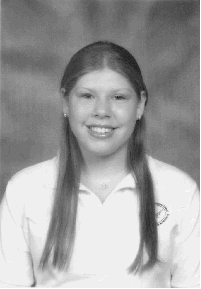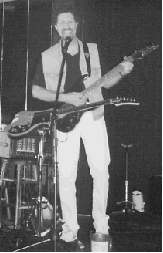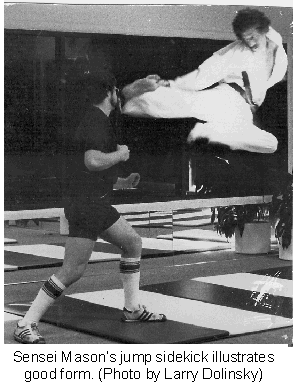
Sempai of the Month
Jennifer Rickel

Jennifer Rickel is a 14-year-old Purple Belt student with an exemplary attitude toward her training. She started training here when she was 11 and has motivated herself as far as she has because she really wants to get her black belt.
“My mom told me that my brother was going to start taking karate,” Jennifer says, “and since I didn’t have a sport to do I should do it also.” She remembers her mom telling her about a friend she had in high school who was a black belt and also taught karate and it convinced her to try it.
Jennifer is a 9th grader who gets A’s and B’s on her report cards. “I know how important it is to get good grades and how it can affect my future,” she said.
In her spare time Jennifer likes to stay after school for sports events and go out with her friends on the weekends. She loves comedy movies and both alternative and punk music, and loves chocolate.
Jennifer has definite ideas of why anyone should train in karate. “I would persuade them by telling them how it is not only great exercise and how you learn self defense, but also how it helps concentration and self control,” she says.
Jennifer told us that she can definitely see herself getting a Black Belt. “Hopefully before I graduate,” she told us. After high school she wants to get into a good college and hopes to excel in whatever she chooses to study.
Many of the instructors here at the dojo have noticed what a wonderfully positive example Jennifer sets for the other students. She is alert and focused, is always respectful and possesses the confidence and control that it takes to get the full benefit of her training. We look forward to seeing her in class as she follows the path that leads to a Black Belt.
© Kendra Smith 2003
Parent Code
It is important that all parents read our Parent Code and abide by its principles. Martial arts can be dangerous, as can other sports, if practiced with an inappropriate (aggressive or negative) attitude. It is vital that all persons connected with the karate school maintain a positive, cooperative approach at all times. Children are especially influenced by the words and thoughts of those in authority in their lives; therefore, we request that parents adopt a positive attitude for the safety of all students.
Since most parents have not grown up with Martial arts it is often difficult for them to understand what their role should be at the Dojo. In other activities such as baseball, dance or tennis most parents have had some experience as participants or coaches. However, Karate is often a new program for a family, hence, its methods are unknown to the parents when they sign their children up. Recently several parents have come into the school to inquire about the disciplinary and corrective measures that we use in our program, which have been specifically designed by Chief Instructor Robert Mason, a Developmental Psychologist. The written curriculum is taught in small steps and stripes and belts denote progress from one rank to another. Instructors award Blue stripes to our Little Dragon and Karate Tigers, and red stripes to our Junior and Adult students to show progress within each rank. When three red stripes are achieved the student should be prepared for promotion to the next belt rank sometimes called a Kyu (pronounced Q) rank. Should inappropriate behavior occur, inside or outside of class, while visiting the karate school, blue or red stripes can be removed by the instructors or staff. They then have to be earned back through renewed effort and sincere practice. If the student has not yet earned a stripe, but needs to lose one, a white stripe is placed on their belt and denotes that red stripes cannot be earned until an instructor decides that the student is ready to have the white stripe removed.
The physical, mental and emotional discipline required of a student in Mudokai Karate is strict so that all students may enjoy their classes and safety can be maintained for all concerned. While instructors and staff will always try to positively reinforce the behavior we want, it is essential to correct misbehavior. When a stripe is taken, or a white stripe given, we need the full support of parents to reinforce the consequence. Sensei Mason discourages instructors, staff and sempai from shouting at students and prefers that they use stripes rather than volume to maintain discipline. We give many more stripes than we take away, but it has been our experience that only by strictly maintaining appropriate boundaries can discipline be developed and enforced for the benefit of the student, the karate school and community.
Chocolate Moose Music Café update
If you are looking for a place to enjoy a good conversation over a cup of tea or coffee, or even a beer or glass of wine, you need look no further than the Pine Island Ridge Plaza in Davie on the South side of SR 84 at Pine Island Blvd. If you play an instrument there is an Acoustic Open Mike from 8:00 pm on Tuesday and a regular Open Mike from 8:00 pm on Wednesday and Saturday. The Café, under new ownership, has been extensively redecorated by artist in residence David Wheatley. On Sundays from 7-11:00 pm Sensei Mason plays guitar as the special guest of guitar wizard Michael Bianco.

Striving to Be Perfect:
a goal in the martial arts
Several weeks ago while a class of Advanced Junior level students was warming up, the Sensei told them to strive for perfection in all that they do. One student spoke up and said that a person could strive to be “perfectly bad”. Sensei then proceeded to explain that, in this instance, he was referring to the kind of effort required to continue to improve their martial arts. The word “perfection” actually means whole and complete, having all the desired qualities, correct in every detail.
The old saying “Practice makes perfect” is true in both aspects, positive and negative, as the clever student noted. So the true meaning of that aphorism is, “Practice makes perfect, so be careful what you practice.“
Martial arts is unique as a sport in that attitude makes a big difference in the student’s ability to learn and the instructor’s ability to teach. So, in order to produce martial artists, and not bullies, the correct (or perfect) attitude is vital.
In the famous karate movie, The Karate Kid, Mr. Miyagi the instructor, emphasized to his student Daniel, the idea that attitude and aptitude go together to form a balanced training perspective. You must train in the correct technique, with the correct attitude, in order to get the most benefit.
When stretching, proper alignment is necessary in order to achieve the goal of flexibility. It is of no use to stretch incorrectly, in a sloppy or lazy manner.
Likewise, bowing needs to be done perfectly. Half-bows or miniature bows are not correct. There is a connection between the physical and the mental; what we do physically is reflected mentally and vice-versa. Martial arts works on all levels which is why perfect practice is necessary in order to achieve perfect progress.
One of my Instructors, Sensei George Sfetas, took Super 8 films of his Kata (this was before the days of videotapes) in order to improve his form, as perfect execution was his goal for himself in the martial arts.
Martial Arts training is about realizing the true master within yourself. It is about feeling connected physically, emotionally, psychologically and spiritually with the source of aliveness and consciousness that is the source of our being. The experience that accompanies this realization is one of completeness, which is the meaning of perfection. The goal of Mastery of the Martial Arts, therefore, goes hand in hand with the ideal of self realization and self actualization, the practice and realization of self knowledge through the experience of perfection.

© Sensei Robert H. Mason 2003